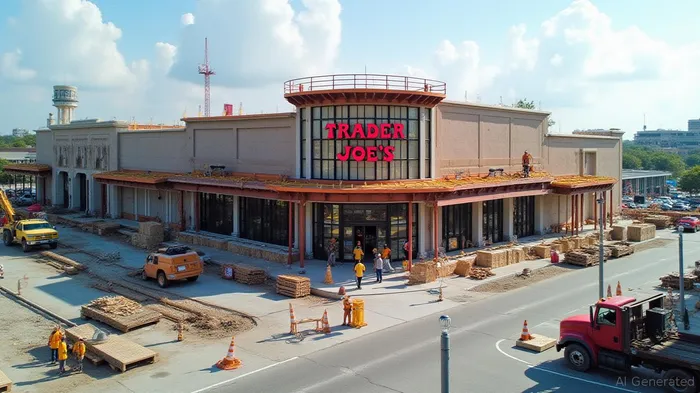Trader Joe's New Orleans Expansion: A Beacon of Opportunity in an Underserved Retail Landscape
Trader Joe's anticipated August 2025 opening in New Orleans marks a pivotal moment for the retail sector's push into underserved markets. The grocer's first store in the city, located at 2501 Tulane Ave in the BioDistrict, is not merely a brick-and-mortar addition but a strategic play in a market grappling with systemic food insecurity and racial inequities. This expansion underscores a broader retail trend: targeting areas where consumer demand outstrips supply, offering both social impact and financial upside.

Why New Orleans is Underserved—and Why It Matters
New Orleans has long been a case study in retail neglect. Over 16% of residents face food insecurity, with marginalized communities like the Lower 9th Ward lacking full-service grocery stores for decades. These areas relyRELY-- on corner markets with limited fresh produce, a reality exacerbated by rising food costs. shows Louisiana's food prices surged 25% since 2019—outpacing the national average—due to inflation and supply chain strains. For Trader Joe's, this gap is a growth opportunity.
The grocer's entry into New Orleans aligns with its reputation for serving affluent, health-conscious demographics—a fit for the Tulane Ave neighborhood's density and affluence. Yet its impact extends beyond this area. The BioDistrict's revitalization plans, including improved streetscapes and innovation hubs, position the store as a catalyst for broader economic renewal. Meanwhile, a second location planned for Freret Street targets Uptown's growing residential base, signaling a deliberate multi-pronged approach to capture diverse consumer segments.
The Retail Playbook for Underserved Markets
Trader Joe's success hinges on addressing structural inequities while maintaining profitability—a balancing act that other retailers have struggled to achieve. The grocer's model—quiry branding, free samples, and community programs like Neighborhood Shares—builds loyalty in areas where trust in institutions is low. In New Orleans, this strategy could counteract the dominance of dollar stores, which often cluster in Black communities despite income levels.
reflects investor confidence in its parent company's ability to innovate in retail. However, the New Orleans venture also carries risks. The city's history of food apartheid—a term highlighting systemic racism in food access—means success depends on navigating local politics and community needs. For instance, the Lower 9th Ward's $2 million redevelopment study emphasizes avoiding displacement, a challenge Trader Joe's must address to maintain goodwill.
Investment Implications: A Long-Term Play
Trader Joe's expansion into New Orleans is a microcosm of retail's broader opportunity in underserved markets. Investors should consider:
1. Demographic Upside: New Orleans' growing population and evolving consumer preferences (e.g., demand for organic, ethically sourced goods) align with Trader Joe's niche.
2. Market Differentiation: In a saturated grocery space, targeting underserved areas reduces direct competition while addressing unmet needs.
3. Policy Tailwinds: Federal programs like the American Rescue Plan Act (ARPA) fund community food hubs, creating synergies for retailers willing to partner with local initiatives.
Yet caution is warranted. The grocer's secrecy around opening dates and reliance on a unique brand could falter in a region with distinct cultural tastes. Additionally, Louisiana's 25% food cost surge since 2019 may test pricing strategies.
Conclusion: A Model for Retail's Future
Trader Joe's New Orleans push exemplifies how retailers can profitably address systemic gaps while fostering community resilience. For investors, this expansion signals a shift toward socially conscious retail growth—a trend that may outlast current inflationary pressures. While risks exist, the grocer's track record in niche markets, combined with New Orleans' pent-up demand, positions this venture as a bellwether for retail's next frontier.
In an era where ESG (Environmental, Social, Governance) principles drive investment, Trader Joe's approach—bridging equity and profitability—could redefine what it means to serve an underserved market. For now, watch the Tulane Ave store's performance: its success may chart the course for retail's next great opportunity.
Delivering real-time insights and analysis on emerging financial trends and market movements.
Latest Articles
Stay ahead of the market.
Get curated U.S. market news, insights and key dates delivered to your inbox.



Comments
No comments yet